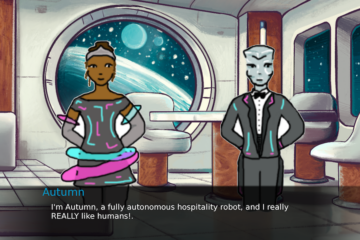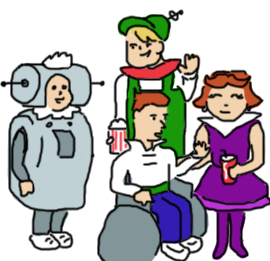Expletives are a shorthand for emotion, and modern American speech is peppered with them. I tried to remove “god” from my vocabulary a few years ago, since, as an atheist, I felt I was being disingenuous. I started saying “Gort” because I thought it was funny. You know, the super-powerful robot in The Day the Earth Stood Still built to enforce morality? That’s a god I can believe in!
But I don’t really believe in Gort, and most people were confused by my reference, having not had my formative experience with Michael Rennie’s cheekbones. In the end it was a fruitless exercise, exchanging one emotional shorthand for another, and now I let myself say “god” now and then.
No one really means “I appeal to my deity!” when they say “Oh god!” It’s simply the American “Ai ya!”
But as I am teaching these days, I have seen in my students’ work a habit of wanting to put in phrases like “Oh god” but.. for science fiction! So the eager student has the protagonist say, “Oh stars!” or they are writing a matriarchal fantasy so it’s “Oh goddess!” or a polytheistic one and it’s “Oh gods!” Or maybe the writer comes up with a neato neologism to stand in for the expletives she wants to insert like, “Oh Fraknar!”
The thing is, in the end, you’re replicating a speech pattern that is very much rooted in the current day American zeitgeist and it feels like it. I’ve been kicked out of the immersion of story by hitting an “oh spirits!”
It’s hard to break out of the habit of normal discourse. There’s a friction, when I’m writing my Atheist Future piece and hit an “oh god” and have to pause. “What would she really say?” Maybe it’s simply, “Oh.”
“Oh, intercourse the penguin,” to quote Monty Python.
Most times, in dialog, you can cut the “oh.” When I look at the novels I wrote in elementary and junior high school, nearly every line begins with “Well,” or “Anyway,” – I’m talking the story to myself. I learned to cut those meaningless syllables, which are only there to create a pause, or to grab a listener’s attention in a noisy cafeteria.
There is no noise to overcome in fiction. Hopefully, you already have their attention.
And so, I find myself contemplating these simple phrases. “Oh God” and its ilk.
Think about why we say, “Oh my god,” in the first place. What does it really mean?
- I’m scared.
- This worries me.
- I find what you said to be
- Unexpected
- In bad taste
- Humorous
- Shocking
- I am experiencing a high emotion.
- I need a moment before I respond
Would the story be more immediate, more vulnerable, if you peeled away the shorthand and showed us what’s underneath it?
Let’s play with this. Here’s a very simple scene:
Margot saw the picture of Thane flash over the customs counter, and she saw her companions all freeze like they were afraid they’d effervesce into space. “Oh god,” she said.
current rough draft of Galactic Hellcats 2, chapter 4.
That’s… not what I’d really write. I’d write something like this:
Margot saw the picture of Thane flash over the customs counter, and she saw her companions all freeze like they were afraid they’d effervesce into space. “We need to get out of here,” she said.
(Full disclosure: I have her not say anything. She grab’s Ki’s collar and hauls ass.)
Margot isn’t experiencing a vague emotion, she’s feeling fight-or-flight.
It feels like unnecessary work, to pause and consider what your character is really feeling, really expressing, but easy answers make for boring fiction.
The good news is, this is work you can put off until revision. The good lord hath gifted us “find and replace” for a reason.
Now… to write the first draft…
Oh, Gort!


